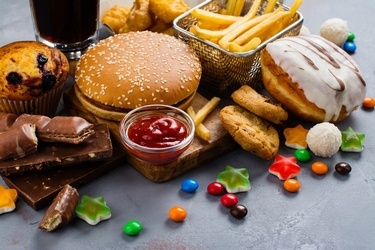Addiction, in its various forms, has a very real and life-changing impact on its victims. Naturally, when most people hear the term “addiction,” they quickly think of drugs, alcohol, or gambling. And, while these are some of the most devastating forms of addiction, there are others which are also widespread but less readily acknowledged. Food addiction, for instance, affects around 5 percent of the population. Yet, it is largely overlooked.
How Does Food Addiction Work?
Food addiction affects people in the same way as any other form of addiction – by tapping into the brain’s reward center. In the brain of someone with a food addiction, substances such as sugar or carbohydrates cause the release of the feel-good hormone, dopamine, in the same way that narcotics or cigarettes may for others.
Unfortunately, although use may start out slowly, the brain will soon require greater quantities at an increased frequency in order to achieve the same results. The more often that an addictive substance is used, the more dopamine that is released. Over time, this flood of the hormone reduces its efficacy, and in order to obtain the same level of satisfaction, an individual must consume more.
How can You Tell if You have a Food Addiction?
Do you really have a food addiction? Everyone likes to eat to some degree, right? So, how can you tell if your relationship with food is fairly normal and healthy or getting out of hand? Here are the signs to watch for:
- You crave certain foods even after eating a good, filling meal.
- When you succumb to cravings, you eat far more than you’d like.
- It is not uncommon to eat a food until you feel overly full.
- Eating certain foods is often followed by feelings of guilt, but these feelings do not dissuade you from eating that food again soon after.
- You find reasons to justify eating what you want.
- You have unsuccessfully tried to impose limits or rules around your eating.
- You hide it from others when you eat certain types or amounts of food.
- You do not feel you have control over eating foods that you know are not good for you.
If you recognize at least half of these symptoms in yourself, you certainly have a problem with food. If you find that 6 or more of them pertain to you, you are almost certainly suffering from a food addiction.
Getting Help for Food Addiction
Many food addicts have attempted to control their unhealthy eating in the past without success. After all, a biochemical disorder is nearly impossible to control through willpower alone, particularly without support. Many food addicts find help in therapy or in support groups such as Food Addicts Anonymous (FAA).
Much like the better-known Alcoholics Anonymous (AA), FAA uses group support and a Twelve Step program to help sufferers move beyond their disease. By following these steps and relying on the support of others who are on the same journey, addicts are often able to make strides that seemed nearly impossible before.
In Zachary, Lane offers a weekly support group that is free and open to any member of our community who may need help. If you are ready to break free from a vicious cycle of unhealthy eating, considering attending one of these events, and discover the resources that are at your disposal.
Every Thursday at 5:30 p.m.
Lane Regional Medical Center
West Wing Conference Room
Call Velma at 225-715-9268 for more details.



.png?width=850&height=850&name=lane%20badge%20(1).png)


-1.png?width=711&height=711&name=healthy%20br%20(4)-1.png)

